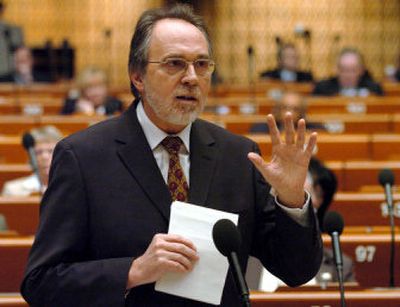U.S. anti-terrorism tactics criticized

A European human rights investigator on Tuesday accused the United States of “unacceptable and appalling” tactics in the fight against terrorism but said he was unable to confirm independently reports of secret prisons run by the CIA in Eastern Europe.
In an interim report presented to the Council of Europe, the continent’s official human rights watchdog, Dick Marty, a Swiss parliamentarian, also accused European governments of either collaborating or looking the other way as U.S. intelligence officers abducted or secretly detained terrorism suspects on European soil.
“We can say that there is a great deal of coherent, convergent evidence pointing to the existence of a system of ‘relocation’ or ‘outsourcing’ of torture,” he wrote in his report, the product of a two-month investigation. “Europe must clearly and unambiguously declare that it refuses outright to tolerate such doings in its territory, or anywhere else.”
Marty has only limited powers to compel individuals and governments to cooperate. His report offered no fresh evidence to support his allegations, and he relied primarily on media reports and previously documented cases to draw his conclusions. In Washington, State Department spokesman Sean McCormack dismissed the findings as the “same old reports wrapped up in some new rhetoric.”
The Council of Europe commissioned the investigation after the Washington Post reported in November that the CIA had operated secret prisons for high-level al-Qaida figures in Eastern Europe since the Sept. 11, 2001, attacks. The Post has not published the names of the Eastern European countries involved in the program at the request of senior U.S. officials who argued that it could disrupt counterterrorism efforts and make those nations a target for terrorists.
Marty said he could not find any “formal, irrefutable evidence” of CIA detention centers in Eastern Europe. He said he had recently obtained satellite data and flight logs from European agencies that could offer clues, however, and cited other “reliable” sources that justified his ongoing investigation.
“I know it will be a long and difficult path,” he said from Council of Europe headquarters in Strasbourg, France, when asked if he expected to find concrete answers. “But as far as the truth is concerned, I am fundamentally optimistic.”
Marty criticized European governments as being less than candid about their role in or knowledge of U.S. counterterrorism operations on the continent. U.S. officials have said they routinely notify or partner with allied intelligence agencies when conducting missions.